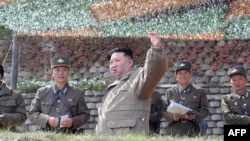North Korean leader Kim Jong Un is likely to outline his plan to meet the goal of having "the world's most powerful strategic force" at a plenary meeting of the Central Committee of the ruling Workers' Party of Korea later this month, according to experts.
North Korea heightened tensions on the Korean Peninsula this year by conducting a record number of missile launches, including firing several intercontinental ballistic missiles (ICBMs) and flying an intermediate-range ballistic missile (IRBM) over Japan.
This week, Pyongyang fired multiple rounds of artillery shells into the maritime buffer zone it shares with South Korea, as it did in November.
In the coming year, this pattern of escalating threats is likely to continue as North Korea seeks to advance its weapons programs, according to experts.
Bruce Klingner, senior research fellow at The Heritage Foundation, said, "There is no indication that Kim will alter course on North Korea's relentless quest to develop and augment its nuclear and missile forces while continuing to threaten the country's neighbors, maintain failed socialist economic policies, and oppress its citizens."
Kim announced on December 1 that the Central Committee of the Workers' Party of Korea will hold a plenary meeting in late December to discuss the regime's plans for 2023.
Citing the year as "historic" because it marks the 75th anniversary of the regime and the 70th anniversary of the cease-fire that ended fighting in the Korean War, Kim said 2023 will be critical in achieving the five-year plan outlined in January 2021.
In that plan, North Korea laid out its goal of developing advanced weaponry including hypersonic weapons, a nuclear-powered submarine, strategic nuclear weapons that can be launched underwater, and reconnaissance drones and satellites.
More tests expected
At the planning session, the regime is likely to lay out ways to enhance its missiles and nuclear weapons so draw nearer to meeting its "ultimate goal" announced late last month of having "the world's most powerful strategic force."
Evans Revere, a former State Department official with extensive experience negotiating with North Korea, said part of that plan is testing key ICBM components and nuclear weapons.
"I expect we will continue to see ballistic missile tests, particularly of those systems and technologies essential to countering the United States," Revere said.
After several failed ICBM tests this year, North Korea announced it successfully tested a "new-type" Hwasong-17 ICBM on November 18 that "proved the reliability of the new major strategic weapon system."
Following that test, experts said North Korea probably would enhance nuclear warhead delivery systems such as multiple independently targetable reentry vehicles (MIRVs) that can drop several nuclear warheads in multiple locations via a Hwasong-17 ICBM, considered to be capable of reaching anywhere in the U.S.
Robert Rapson, charge d'affaires and deputy chief of mission at the U.S. Embassy in Seoul from 2018 to 2021, said, "Kim Jong Un will stay the course to include continued testing of its missile systems and possibly even a seventh nuclear test and more in its efforts to shake loose concessions [such as] sanctions relief from the U.S. and the Republic of Korea."
South Korea's official name is the Republic of Korea (ROK).
Growing defiance
China's and Russia's opposition to any U.N. Security Council actions against North Korea's ballistic missile tests will likely encourage Pyongyang to unleash its provocations unrestrained, said experts.
Klingner said, "This year, Pyongyang continued its defiance of the international community by conducting over 70 violations of U.N. resolutions. While the number and frequency of violations may fluctuate over time, the trend [is projected to remain] constant."
As permanent members of the U.N. Security Council with veto powers, China and Russia opposed passage of a U.S.-drafted resolution May 26 following North Korea's ICBM test the previous day.
Beijing and Moscow again opposed any Security Council actions on North Korea during a November 4 meeting called in response to an ICBM test the day before.
"Pyongyang regards the continuing deterioration of U.S.-Russia and U.S.-China relations as beneficial to its own strategic posture," Revere said.
"This has given the North Korean regime a greater sense of confidence in its ability to survive, and even thrive, as it contends with its adversaries," he added.
Dialogue unlikely
Ken Gause, director of strategy, policy, plans, and programs division special projects at CNA and an expert on North Korean leadership, said North Korea launches missiles in part to pressure Washington and Seoul to engage with it and to make concessions such as lifting sanctions.
For the North Koreans, conducting weapons tests is "a kind of double-edged sword. [First,] it helps develop their capabilities and its deterrent, but it [also] puts pressure on the U.S. and South Korea to engage North Korea."
Kim dismissed any chance of holding denuclearization discussions when he announced the legalization of preemptive use of its nuclear weapons in September. His influential sister Kim Yo Jong also rejected a South Korean proposal for talks in August.
Revere said any possible options for talks that Pyongyang might float will reflect its determination to retain recognition as a nuclear power.
"North Korea has declared that dialogue about denuclearization is dead," he said. "But the DPRK continues to seek international acceptance of its nuclear status, so I believe we may see hints about Pyongyang's willingness to discuss 'arms control' with the United States in the coming year," he continued, referring to North Korea's formal name, the Democratic People's Republic of Korea.
Any such talks, however, will involve North Korea's demand that the U.S. limit its tactical and strategic arms in and around the Korean Peninsula, Revere warned.
Dialogue between Washington and Pyongyang has remained stalled since October 2019, even though the Biden administration has said it remains open to talks without preconditions.




